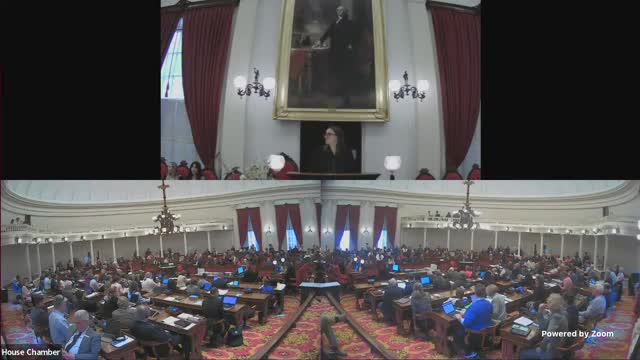Vermont lawmakers push for data privacy bill amid concerns over anonymous app Fizz
May 09, 2024 | HOUSE OF REPRESENTATIVES, Committees, Legislative , Vermont

This article was created by AI summarizing key points discussed. AI makes mistakes, so for full details and context, please refer to the video of the full meeting. Please report any errors so we can fix them. Report an error »

In a pivotal session on May 9, 2024, the Vermont House of Representatives convened to discuss significant amendments to data privacy legislation, specifically focusing on the protection of children's data and the responsibilities of businesses handling such information. The meeting highlighted the urgent need for regulatory measures in an increasingly digital landscape, particularly following alarming incidents involving anonymous social media applications like Fizz, which have raised concerns about student safety and mental health.
A member of the House shared a personal account illustrating the dangers of unregulated digital platforms. The story detailed how the Fizz app, designed to foster community connections among students, quickly became a source of distress, with harmful posts targeting individuals within the school community. This incident underscored the necessity for stronger data protections, particularly for vulnerable populations such as children and teenagers. The member emphasized that the proposed legislation, H 121 and S 289, represents a crucial first step in regulating an industry that often prioritizes profit over the well-being of its users.
The discussion also delved into the complexities of defining biometric and neural data within the bill. Legislators raised questions about whether the current definitions adequately cover emerging technologies that could impact personal privacy. One member expressed concerns about the implications of advancements in neural technology, such as those being developed by companies like Neuralink, which could blur the lines between human cognition and digital data collection. The need for ongoing dialogue and potential future amendments was acknowledged, as the bill is not set to take effect until 2025.
Another key point of contention was the inclusion of a private right of action, which would allow consumers to seek legal recourse against businesses mishandling their data. Some legislators argued that this provision is essential for holding large corporations accountable, while others cautioned that it could disproportionately affect smaller Vermont businesses. The debate highlighted the tension between consumer protection and the potential burdens placed on local enterprises.
As the session progressed, members expressed strong support for the bill, recognizing it as a necessary measure to safeguard consumer rights in an era of rapid technological change. The House is expected to vote on the proposed amendments soon, with many legislators advocating for a robust framework that prioritizes privacy and accountability in data handling.
In conclusion, the discussions during this House session reflect a growing awareness of the challenges posed by digital technologies and the imperative for legislative action to protect individuals, particularly children, from potential harms associated with data misuse. The outcome of this bill could set a precedent for future regulations in Vermont and beyond, as lawmakers navigate the complexities of privacy in the digital age.
A member of the House shared a personal account illustrating the dangers of unregulated digital platforms. The story detailed how the Fizz app, designed to foster community connections among students, quickly became a source of distress, with harmful posts targeting individuals within the school community. This incident underscored the necessity for stronger data protections, particularly for vulnerable populations such as children and teenagers. The member emphasized that the proposed legislation, H 121 and S 289, represents a crucial first step in regulating an industry that often prioritizes profit over the well-being of its users.
The discussion also delved into the complexities of defining biometric and neural data within the bill. Legislators raised questions about whether the current definitions adequately cover emerging technologies that could impact personal privacy. One member expressed concerns about the implications of advancements in neural technology, such as those being developed by companies like Neuralink, which could blur the lines between human cognition and digital data collection. The need for ongoing dialogue and potential future amendments was acknowledged, as the bill is not set to take effect until 2025.
Another key point of contention was the inclusion of a private right of action, which would allow consumers to seek legal recourse against businesses mishandling their data. Some legislators argued that this provision is essential for holding large corporations accountable, while others cautioned that it could disproportionately affect smaller Vermont businesses. The debate highlighted the tension between consumer protection and the potential burdens placed on local enterprises.
As the session progressed, members expressed strong support for the bill, recognizing it as a necessary measure to safeguard consumer rights in an era of rapid technological change. The House is expected to vote on the proposed amendments soon, with many legislators advocating for a robust framework that prioritizes privacy and accountability in data handling.
In conclusion, the discussions during this House session reflect a growing awareness of the challenges posed by digital technologies and the imperative for legislative action to protect individuals, particularly children, from potential harms associated with data misuse. The outcome of this bill could set a precedent for future regulations in Vermont and beyond, as lawmakers navigate the complexities of privacy in the digital age.
View full meeting
This article is based on a recent meeting—watch the full video and explore the complete transcript for deeper insights into the discussion.
View full meeting